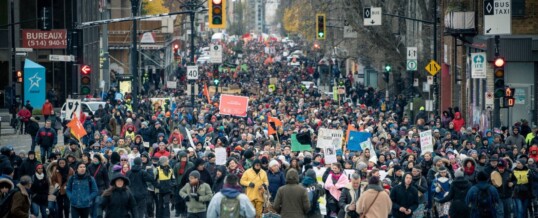
McLeod Group blog, December 3, 2018
In October, the report of the Intergovernmental Panel on Climate Change (IPCC) hit the press like a bomb. The headlines since then have been relentless and shocking:
- “UN report calls for urgent action to avert catastrophic climate change”, The Globe and Mail, October 8, 2018
- “‘Devastating’ Human Impact on Planetary Health”, IISD, November 6, 2018
- “The Earth is in a death spiral”, The Guardian, November 14, 2018
- “Canada among worst offenders as world falls short of climate-change targets”, CBC, November 16, 2018
Even for those of us who have been aware of the implications of climate change, the urgency of the message – 12 years to take action to hold the rise in temperature to 1.5ºC – has been sobering.
The signatories of the 2015 Paris Agreement on climate change are meeting in Katowice, Poland, December 2-14, to discuss the findings of the IPCC report, and review their national climate change plans. There is little evidence that the plans will be sufficient to meet the targets. The scope of the transformational change required at individual, municipal, national and global levels to hold warming to 1.5ºC is unprecedented.
A key element of the debate has been climate finance. Who will pay for the prevention, adaptation and mitigation efforts required to address climate change? This is particularly urgent for countries in the Global South, who contributed least to the problem, and are already feeling the impacts of climate change which will only intensify as the temperature rises.
What will it take to get all of us – citizens and politicians, corporations, media and community leaders – to act effectively to meet this challenge?
As George Monbiot recently wrote in The Guardian, “It is not just governments that have failed to respond, though they have failed spectacularly. Public sector broadcasters have systematically shut down environmental coverage, while allowing the opaquely funded lobbyists that masquerade as think tanks to shape public discourse and deny what we face.”
There are several obvious factors that may help to explain why we are acting like ostriches in the face of this crisis.
- The challenge seems so daunting that there’s little a person can do. There is a greater emphasis on describing the nature of the problem, compared to outlining the actions we need to take that will contribute to the solution.
- Communication and action on climate change tend to be in silos. If a columnist in a newspaper’s business section describes the economic crisis in Alberta because of low oil prices, there’s no climate change analysis, or vice versa.
- Communications like the “Summary for Policymakers” of the latest IPCC report make very difficult reading for the layperson.
- The very complexity of climate change means we tend to act on whatever seems most noticeable, or easiest, rather than what will make the best contribution to mitigating climate change.
Instead, we need to determine what actions will have the most effective impact in averting disasters in the short and medium term and find the points of political pressure at all levels.
First, action needs to take place at all levels from local to global, and include citizens, communicators, and policymakers. For example, Copenhagen is well on the way to being carbon neutral by 2025, and other cities may be inspired to emulate its commitment. Addressing climate change is a cause that requires “both/and” thinking, not “either/or” thinking. Because there is not yet an emerging consensus on which actions will create the most leverage for positive action, there needs to be support for experimentation that will identify the most effective policies and actions, and rapid sharing of evidence on the results.
Second, Canada needs a comprehensive federal government climate plan and strategy. The recent announcement of a new federal government advisory panel on climate change, which will look at greening the transportation and building sectors, is a good move. Government policy can make use of market mechanisms through actions like carbon taxes and “polluter pay” requirements for all corporations. Market mechanisms can be effective in creating rapid economic and technical change. The plan should also include a range of regulatory policies and green investment initiatives. Many of the tools have already been invented. What is required is the political will to use them.
Thirdly, citizens need to create more political pressure. We need more mass demonstrations as seen in September in Paris and on November 10 in Montreal, where 50,000 people marched in the streets to demand climate action, to bring home to politicians and corporate leaders the message that citizens want change. Specific pressure on politicians and key decision-makers at the municipal, provincial, federal and global levels to develop plans – for transportation, resource management, housing, water management, etc. – commensurate with the seriousness of the threats. We need to demand more cooperation, coordination and innovation among environmental and other social action groups, and develop new ways of political organizing and new messaging.
The McLeod Group has decided that we want to become more involved in the discussions and actions in addressing climate change. We want to hear from you. What are you doing and what can be done to address this unprecedented global challenge? Our email address is mcleodgroup12@gmail.com. We will publish a selection of thoughtful responses.
Photo: Eric Demers, Fédération des Travailleurs et Travailleuses du Québec, National Observer, November 21, 2018.
